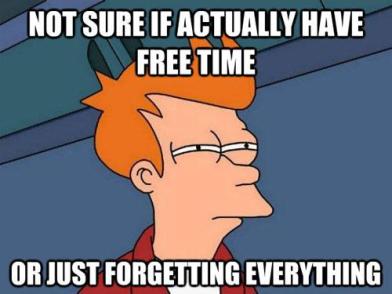I started writing this blog post a few weeks ago, wasn’t sure where I wanted to go with it, and thus let it float aimlessly in ‘drafts’ for a while. This is, apparently, the story of my writing-life at the moment. Anyway, this post’s focus is on this question:
When someone asks you what you do, do you say you’re a writer?
Chances are, if you’re a writer with writer friends you’ve asked or been asked this question at least once in your life. I’ve recently found myself thinking about this. It’s a question composed of a confusing tangle of yet more questions. For example, there is what I have affectionately started calling ‘the writer title’ debate, which in essence questions what a writer is – Is everyone who writes a writer, or just those who do it professionally? Is writing something you merely do, or is it who you are? And if it’s who you are, does that mean the art of writing defines you as a person?
Like I said, confusing tangle…
Right now I’m thinking about this question in relation to a specific area of my life. I’m graduating in December, and I’m not going back to uni this year which means for the first time in 6 years, I’m not a student. Suddenly, I have the time to write. I no longer have to use my stories as procrastination – they have served as the perfect distraction from essays, mind maps, reading, research, and tutorial preparation. Now I’m suddenly swimming in time and I’m not using it productively.
Most of the time, this is me:
 I’ve always identified as being a writer, but if anyone ever asked me ‘So, what do you do?’ I would always answer: ‘I’m a student.’ Now I have to reevaluate, not only what I do with my time, but what I’m not doing with it. What was once used for procrastination is now being neglected, because I don’t have anything to avoid, except actually writing the stories I spend most of my day thinking about.
I’ve always identified as being a writer, but if anyone ever asked me ‘So, what do you do?’ I would always answer: ‘I’m a student.’ Now I have to reevaluate, not only what I do with my time, but what I’m not doing with it. What was once used for procrastination is now being neglected, because I don’t have anything to avoid, except actually writing the stories I spend most of my day thinking about.
As for the writer title, everyone has their own beliefs, and I’m sure I’ve babbled on the subject myself at some point already in this blog (I have scrolled up and down multiple times and I can’t find it, even though I’m about 99.9% sure I already blogged about it. Maybe I just thought about it. Or dreamed it. It’s sad, but my dreams really are that boring.) I for one would never say ‘I’m a writer’ – I’m much more likely to say ‘I’ve just finished uni’ or ‘I work in H&M part-time’ – and not because I’m embarrassed about writing like I once was.
Once, saying something like that would make people – my family – laugh. Y’know, that age old response of ‘everyone can write’ or ‘that isn’t even a real job.’ After years of studying it, I’ve started feeling less uneasy about embracing the pretend people in my life, to accepting I’m one of those people who leans against the wall at parties and thinks ‘I could totally be in my room right now with my pjs on, a cup of tea beside me, writing.’
What I do know is, it’s okay to be mildly anti-social, to watch the social butterfly from afar and think of them as a foreign entity. But by the same token, it’s also okay to be a writer and not write, to take the time to find your footing again. My life has tumbled and rearranged itself into something I haven’t been yet, and that’s going to take a little time to get used to.